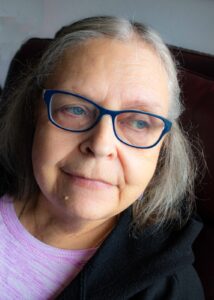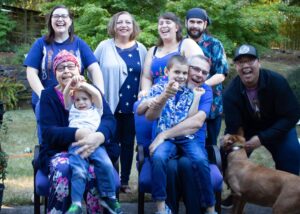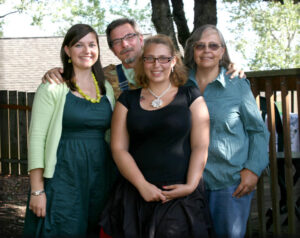ONE: BREASTS
Decades ago, when my kids were very young, I’d often be awake during the still, wee hours of the night. Maybe a stomachache or nightmare had roused a young toddler. Or perhaps I’d find myself gliding rhythmically in the rocking chair, fussy baby nestled in my arms, nursing them back to sleep. Sometimes I’d hear the roar of a car engine and screeching tires breaking the hushed peace of night. Warm summer evenings often brought roving bands of teenagers carousing along the suburban street just behind my backyard. They sounded drunk, but I couldn’t be sure. What I did know for sure was that ever since I became a mother, revving engines and squealing tires at 3:00AM now struck fear in my heart. I wondered about the parents–were they awake and worried about their kids? With both of my children safe and accounted for in our home, I was grateful to not have to worry. Even through the most sleep-deprived years, I appreciated those times of being up in the middle of the night with my children. Like everything else, I knew those times were fleeting.
We weren’t but a month into quarantine when my boobs began to ache. Reminiscent of those early breast feeding days when my milk ducts would plug and my boobs would throb with the angry heat of inflammation, I was startled. I changed bras, I self-examined for suspicious lumps and I talked endlessly about my sore boobs to my quarantine family. Googling my symptoms brought forth few answers and after one-too-many painful, sleepless nights, I called my doctor and scheduled a virtual office visit. After carefully listening to my complaints and asking a few follow-up questions, she deemed my symptoms “fascinating” and assured me that she didn’t think it was anything too alarming. She asked me about my quarantine, how my kids were and where they were living. She shared a common story of a post-menopausal woman who suddenly started her period again when her daughter was carrying her first grandchild. “Our emotions and hormones are powerful influencers in our physical health,” she told me, “and these are extraordinary times.” She wondered how much my worry about the pandemic and the welfare of my (now young adult) children played into how my body was feeling.
My daughter was in Seattle, finishing up her winter quarter at the University of Washington. My son had recently relocated to the Bay Area and was living in one of the first regions to go into full lockdown. Did I worry about them? Without a doubt–and then some. I remembered the horror of 9/11 and how grateful I was at the time to have my (then very young) children with me. Thankful that I could control their intake of scary information and be a steady, comforting presence. To be able to see their faces and know if they were okay or afraid. And now, how everything seemed to be slipping out of control.
My doctor offered me several paths to help resolve the ache in my breasts, beginning with a simple supplement that would help balance out my hormones. She reminded me to get my regular mammogram once clinics opened up again for routine screenings. I researched the supplement, read reviews and began taking it later that afternoon. Within three days, the searing pain in my boobs subsided. Within a week, it was completely gone and hasn’t returned.
Breasts: Represents mothering and nurturing and nourishment. A refusal to nourish the self. Over mothering. Over protection.
TWO: JAW
I blame my TMJ on the orthodontist I had as a young teenager with braces. Once the wires and brackets had come off and my teeth were straight and my smile dazzling, he outfitted me with a black, rubber mouthguard. He considered himself “cutting edge” and the bulky mouthguard was prescribed in place of the more traditional wire and acrylic retainer most kids wore after getting their braces off. I was to wear the appliance at home during the day, and then only at night for an indeterminate time. My teeth remained aligned and dazzling, but my jaw soon began to pop and click. Popcorn, bagels and gum would send me into a tailspin of jaw pain and headaches. A routine cleaning at the dentist was always followed up by vigorous self-massage of the muscles on the sides of my face. With time and a few different custom night guards, my jaw relaxed and my TMJ became a rare annoyance.
As quarantine marched on with no end in sight, I began to wake up with headaches. At first, it was just mild pain that would quickly diminish within an hour of waking. I’d rub my neck and do some yoga and be back to normal by breakfast. But rather than subsiding, the headaches ramped up significantly. I’d awake in the middle of night with such searing pain that I’d sit up on the side of the bed, not knowing if I would vomit or cry or both. With my hands cupping the sides of my face, I’d instinctively dig my thumbs into the thick fibers of my jaw and will them to release. I’d get up and stand under the strong jets of my shower and roll my neck back and forth, letting the water pressure discharge the tension. As severe as the headaches were upon awaking, by lunchtime they were usually gone.
So much of this pandemic has made me angry. The misinformation and mismanagement from our government. The loss of income and security, of no fault of my own. Hate and racism running rampant. The complete lack of control over so much. Constant anxiety and fear about getting sick, or unknowingly exposing others. The loss of hundreds of relationships that I had with the people I taught yoga to each week. Literally overnight, like a hundred little deaths all at once. How do you effectively grieve that? On the surface, I didn’t seem or feel outwardly angry. But at night, when so much of our subconscious creeps into that liminal dream space and lands in our bodies, I was mad as hell.
With a history of TMJ and teeth grinding, I’ve worn a night guard for years. I examined my old appliance, noticing wear and cracks in the plastic. In the midst of a pandemic, I knew I couldn’t see my dentist anytime soon, so I made an appointment with my chiropractor. I told him about my new puppy, Bear, and how I remembered being so angry when he wouldn’t stop nipping at my hand while trying to teach him to walk him on a leash. How in frustration, I unconsciously clenched my jaw and felt my teeth crack and crunch. My chiropractor chuckled and after a quick exam, confirmed that my jaw was a mess. He made his adjustments and sent me on my way. Relief was gradual but sure. The headaches disappeared, but I could still feel my jaw lock and pop out of joint when eating certain foods. A month later, I got another adjustment and this time, my chiropractor showed me an exercise to help strengthen and release the affected muscles. Like magic–or perhaps science–my jaw is finally pain free again.
Jaw Problems: Anger. Resentment. Desire for revenge.
THREE: BELLY
My emotions have always set up shop in my belly. Butterflies at the heady rush of new love. That queasy adrenaline before embarking on a new adventure. A sure feeling of knowing-without-knowing when I sense negative energy in a person, place or situation. The heaviness of dread when I’m worried about someone I love.
My belly and I have had a complicated relationship.
As a young woman with body dysmorphia and anorexia, I would often grab at the flesh of my belly, grasping it in my hand with disgust. Gross! I would exclaim to myself in the mirror. I learned this from being a woman. It’s what we do. I pushed down any and all feelings, especially hunger. Over the years, I successfully conditioned myself to not feel physical hunger and I wore that numbness like a badge of honor. My belly was a nuisance at best and the smaller, flatter and quieter I could make it, the better. Not only did I quash hunger cues from my belly, but I also discredited other messages it sent me–emotional hunger, gut feelings, fear, sadness, anger. I shut it down because shutting down is so much easier than feeling and dealing. The body is clever and wise, however, and shutting down only works for so long before things rise back to the top, sometimes in the form of dis-ease.
Yoga introduced me to a new relationship with my belly as well as the rest of my body and mind. It was a slow process–as most of yoga is–to relearn conditioned behaviors and beliefs. To be able to place my hand over the ever-changing rise of my stomach and feel love, trust, and appreciation rather than disgust. To take the time to ask it what it needs, to listen to what it is telling me. My heart ached with recognition when, in my yoga classes, I’d instruct my yogis to do the same and I’d see so many women unable to touch their bellies without frantically rooting around for protruding ribs and hip bones or other signs of being “thin enough.”
Throughout the pandemic, I’ve been aware of a constant ball of dread tightly tangled in the pit of my belly. With both The Mister and I unemployed for the past six months, I worry about the financial impact of all this unknown. I see my friends and family struggling with significant health issues and I worry about them, too. Every morning, I get up and wonder what I should do, what can I do and what I might need to release. When I wake up in the still, wee hours of the night and anxiety roils in my belly, I find comfort in my yoga practice:
Breathe in, breathe out. Inhale, exhale. I am safe. I am healthy, strong and resilient. I am open to moving in new directions and I can flex and adjust to my situation.
The ball of dread often loosens and fades away.
I’m fond of telling people that even as a yoga teacher, I am not “woo-woo.” I insist that I don’t speak with flowery words or believe that essential oils have magical powers. I’m a straight-shooting, reality-rooted, sensible yoga teacher. Recently though, it was brought to my attention that while I might not be “woo-woo”, I am decidedly “woo.” Okay. I can deal with that.
If being “woo” means that I trust and respect the messages my body sends me, then so be it. If it means that I believe that our emotional health is unshakeably intertwined with our physical health, then hell yes I am “woo.” We humans don’t exist as two separate parts–brain, and then body. It’s all connected.
Stomach: Holds nourishment. Digests ideas. Dread. Fear of the new. Inability to assimilate the new.
EPILOGUE
A dear friend and I each have the same book on our nightstands. It is a small, thin volume that has become our mutual handbook for our physical and emotional health. Titled “Heal Your Body” by Louise Hay, we will often text each other when experiencing mysterious symptoms and ask each other if what we find in the book resonates with us. We don’t downplay the reality of serious disease or dismiss the importance of seeking traditional allopathic medical treatment. And we both agree that genetics and fate play a huge role in our health. We laugh at what we find in the book and then gasp at the truth it tells us. We take what the book says with a grain of salt and an open-minded air of curiosity.
Louise Hay writes:
I’ve learned that there are really just two mental patterns that contribute to dis-ease: fear and anger. Anger can show up as impatience, irritation, frustration, criticism, resentment, jealously or bitterness. These are all thoughts that poison the body. When we release this burden, all the organs in our body begin to function properly. Fear could be tension, anxiety, nervousness, worry, doubt, insecurity, feeling not good enough, or unworthiness. Do you relate to any of this stuff?
I do. Without a doubt.
I’m certainly no saint. I’ve done my fair share of numbing and avoiding during these last six months. Whether it’s enjoying too much bourbon or distracting myself with quarantine baking projects, sometimes I give myself the grace of imperfection. But be it a few hours or a few days, I always return to the practices that bring me back to myself–yoga, meditation, writing, adequate hydration, exercise and movement that feels life-affirming rather than energy-depleting.
You may have heard that these are extraordinary times. What is your body telling you?
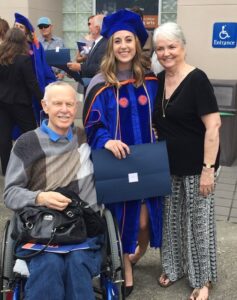
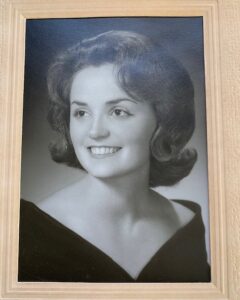


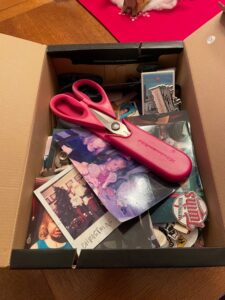
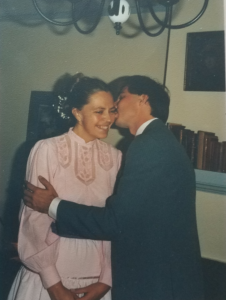 My sister died on Good Friday.
My sister died on Good Friday.